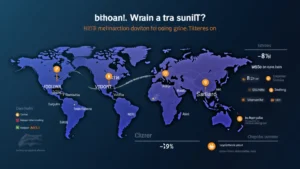Introduction: The Potential of Blockchain in Vietnam’s Energy Sector
Vietnam is rapidly emerging as a hub for blockchain innovation, particularly in the energy sector. In 2024, the global energy market is expected to grow significantly, and Vietnam stands to benefit from the integration of blockchain technology. With approximately 4.5 million users actively engaging in cryptocurrency and blockchain projects in Vietnam, it’s clear that there is a growing demand for sustainable, transparent, and efficient energy solutions. This article will delve deeply into how blockchain can revolutionize Vietnam’s energy landscape.
Vietnam’s Energy Landscape: Current Challenges
The Vietnamese energy sector faces various challenges, including:
- Increasing energy demand due to economic growth
- Dependence on fossil fuels and non-renewable energy sources
- Challenges in energy distribution and management
According to the Ministry of Industry and Trade, Vietnam’s energy consumption is projected to increase by 7% annually. Addressing this growing demand requires innovative solutions. This is where blockchain comes into play.

How Blockchain Technology Can Improve Energy Efficiency
Blockchain offers a decentralized system that can enhance energy management in multiple ways:
- Smart Contracts: Automate energy transactions without intermediaries, reducing costs.
- Decentralized Energy Distribution: Facilitate direct energy trading between consumers and producers.
- Enhanced Transparency: Provide immutable records of energy production and consumption.
As an example, imagine a neighborhood solar energy project where households can sell excess energy to neighbors through a blockchain platform, increasing accessibility and incentivizing renewables. This system exemplifies the potential of blockchain technology for creating more localized and sustainable energy solutions.
Bitcoin and Energy Consumption: A Case Study for Vietnam
In recent years, the energy consumption associated with bitcoin mining has come under scrutiny. However, Vietnam has the opportunity to leverage its renewable energy resources for mining operations.
- Hydropower: Current energy generation primarily comes from hydropower, offering a potential low-carbon footprint for crypto mining.
- Solar and Wind: With vast potential in solar and wind energy, these resources could power mining farms sustainably.
According to a report by the Institute of Energy in Vietnam, over 10,000 MW of wind and solar power capacity is expected to be installed by 2025, supporting potential crypto mining operations that could drive the blockchain economy forward.
Real-world Examples and Initiatives
Several projects in Vietnam are already utilizing blockchain technology in their energy efforts:
- Switch Energy: A platform that allows users to trade renewable energy credits securely.
- Blockchain in Smart Cities: Projects aimed at integrating blockchain into urban energy management systems.
These early adopters demonstrate that the intersection of blockchain and energy can create innovative solutions that benefit consumers and promote sustainable practices.
Future Outlook: Blockchain Energy Trends in Vietnam
As we look ahead to 2025, several trends are expected to shape the blockchain energy landscape in Vietnam:
- Increased Adoption of Renewable Energy: With continued government support and incentives.
- Integration with IoT: Smart meters and device connectivity may become a norm for efficient energy usage.
- Focus on Energy Security: Ensuring reliable power supply in a decentralized manner.
The Vietnamese government has set ambitious targets for renewable adoption, aiming for 30% from renewables by 2030. This commitment could foster a favorable environment for blockchain technology to thrive in the energy sector.
Conclusion: Embracing Blockchain for a Sustainable Energy Future
Vietnam’s blockchain energy potential is significant, offering innovative solutions to its energy challenges. As blockchain technology matures, it’s crucial for stakeholders to invest in education, infrastructure, and regulatory frameworks to harness its full potential.
By embracing blockchain, Vietnam not only stands to enrich its energy capabilities but also leads the way in creating a model for sustainable energy practices globally. As we approach 2025, the integration of blockchain technology into the energy sector will likely emerge as a cornerstone for economic growth and sustainability in Vietnam.
For further insights on blockchain security, visit hibt.com for resources tailored to help you understand and implement these technologies effectively.
As blockchain technology evolves, Vietnam’s commitment to integrating it into the energy sector may set a standard for other nations. The journey is just beginning and stakeholders should stay informed and engaged in these shifts.
For continuous updates on blockchain trends in Vietnam, keep an eye on reliable resources, and consult local experts. Together, we can pave the way for a greener future powered by innovative technology.











